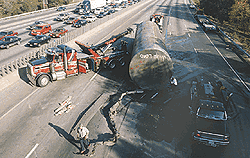Towing Officials Say Their Bills Often Reflect Exceptional Costs
 |  Michael James - Transport Topics |
 | Tow crews work to remove an empty storage tank that fell off a tractor-trailer and closed part of Interstate 495 near Washington, D.C. |
At the same time, there are steps, involving the police and truck owners as well, that may help in holding down towing expenses and resolving conflicts over fees and practices.
Because the number of big rig crashes is declining — down 6% between 1988 and 1998, according to federal statistics — O’Connell says the cost of heavy-capacity wreckers, at $150,000 to $300,000 for each unit, and keeping personnel on duty must be spread over fewer incidents. “When a truck goes out for several hundred dollars an hour, there’s a lot of overhead that goes with it. A company has to take that into account.”
“Our first priority is to open the highway — whatever it takes,” says Sgt. Tom Martin of the Virginia State Police in Leesburg, Va., who has patrolled some of the nation’s most congested roads in the Washington, D.C., area and has monitored the cleanup of hundreds of accidents involving big rigs over his 26-year career.
For the full story, see the Jan. 29 print edition of Transport Topics. Subscribe today.

